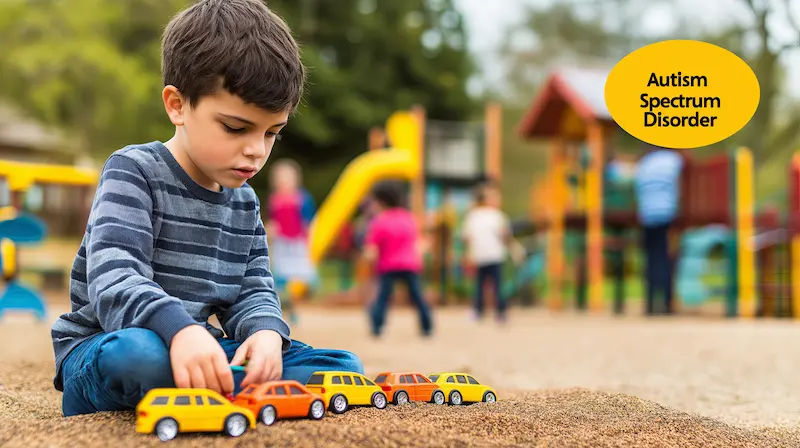Understanding the Reasons for Autism
know the reasons for autism, possible causes, how it affects the daily life and how to manage the autism. Learn when to seek a doctor and more.


Introduction
Autism, or Autism Spectrum Disorder (ASD), is a developmental condition that affects how a person communicates, interacts, and behaves. While the exact causes of autism are still being researched, scientists believe it results from a combination of genetic and environmental factors. Understanding these reasons can help families, caregivers, and individuals with autism navigate the condition with greater awareness and support.
What Is Autism?
Autism is a spectrum disorder, meaning it affects people differently and to varying degrees. Some individuals may have mild challenges, while others may require significant support in daily life. Common characteristics of autism include:
- Social communication difficulties – Trouble understanding social cues, making eye contact, or engaging in conversations.
- Repetitive behaviors – Such as hand-flapping, rocking, or strict adherence to routines.
- Sensory sensitivities – Over- or under-reacting to sounds, lights, textures, or smells.
Consult Neurologist for Personalised Advice
Possible Causes of Autism
While no single cause has been identified, research suggests that autism develops due to a combination of factors:
1. Genetic Factors
- Many studies indicate that genes play a significant role in autism. If a family member has autism, there is a higher chance that another family member may also have it. Certain genetic mutations and syndromes (such as Fragile X syndrome) are linked to ASD.
2. Environmental Influences
Environmental factors during pregnancy or early childhood may contribute to autism. These include:
- Prenatal exposure – Infections, certain medications, or exposure to toxins.
- Birth complications – Premature birth, low birth weight, or oxygen deprivation.
- Parental age – Older parents (especially fathers) may have a slightly higher risk of having a child with autism.
3. Brain Development Differences
- Brain scans show that some individuals with autism have differences in brain structure and connectivity.
- These differences may affect how the brain processes information and responds to the environment.
4. No Link to Vaccines
- Extensive research has confirmed that vaccines do not cause autism. This myth originated from a now-debunked study, and multiple large-scale studies have found no connection between vaccinations and ASD.
How Autism Affects Health and Daily Life?
Autism impacts each person differently. Some individuals may excel in certain areas (like math or art) while struggling with social interactions. Others may face challenges with speech, sensory processing, or emotional regulation. Common health-related concerns include:
- Sleep difficulties – Many children and adults with autism have trouble falling or staying asleep.
- Digestive issues – Some experience gastrointestinal problems like constipation or food sensitivities.
- Anxiety and depression – Social challenges and sensory overload can contribute to mental health concerns.
Managing Autism: Tips for Support
While there is no "cure" for autism, early intervention and supportive strategies can significantly improve quality of life. Here are some helpful approaches:
1. Early Intervention
- Speech therapy, occupational therapy, and behavioral interventions (like ABA therapy) can help children develop communication and social skills.
2. Structured Routine
- Many individuals with autism thrive on predictability. A consistent daily schedule can reduce anxiety.
3. Sensory-Friendly Environment
- If bright lights or loud noises are overwhelming, creating a calm space with dim lighting or noise-canceling headphones can help.
4. Healthy Diet and Exercise
- Some children with autism have food sensitivities. A balanced diet and regular physical activity can improve mood and overall health.
5. Emotional Support
- Encouraging self-expression through art, music, or writing can be therapeutic. Counseling can also help with anxiety or emotional challenges.
When to Seek Professional Help?
If you suspect your child may have autism, look for early signs such as:
- Delayed speech or lack of response to their name.
- Limited eye contact or social engagement.
- Repetitive movements or intense focus on specific interests.
Consulting a pediatrician or developmental specialist can lead to early diagnosis and support.
Final Thoughts
Autism is a complex condition with no single cause, but understanding the possible factors can help families provide better care. With the right support, individuals with autism can lead fulfilling lives, embracing their unique strengths while receiving help for their challenges.
Consult Neurologist for Personalised Advice
Consult Neurologist for Personalised Advice

Dr Debnath Dwaipayan
Neurosurgeon
9 Years • MBBS, MS(Gen. Surgery), DrNB (Neurosurgery)
Delhi
Apollo Hospitals Indraprastha, Delhi

Dr Rajesh Venkat Indala
Neurologist
10 Years • DNB, DM FAAN
Chinagadila
Apollo Hospitals Health City Unit, Chinagadila
(175+ Patients)

Dr. Aditendraditya Singh Bhati
Neurosurgeon
21 Years • MBBS(2004), DNB Neurosurgery(2014); MNAMS; Fellow Skull Base Endoscopy (Italy), Fellow Extended Skull Base ( Weill Cornell, USA), Fellow ZAP-X Radiosurgery. Member of American Association of Neurological Surgeons
Delhi
Apollo Hospitals Indraprastha, Delhi
(100+ Patients)

Dr. Rashmi Devaraj
Neurologist
11 Years • MBBS, MD PEDIATRICS, DM NEUROLOGY
Bengaluru
Apollo Medical Center, Marathahalli, Bengaluru

Dr. Ganeshgouda Majigoudra
Neurologist
10 Years • MBBS, MD ( GENERAL MEDICINE) DM (NEUROLOGY)
Bengaluru
Apollo Clinic, JP nagar, Bengaluru
Consult Neurologist for Personalised Advice

Dr Debnath Dwaipayan
Neurosurgeon
9 Years • MBBS, MS(Gen. Surgery), DrNB (Neurosurgery)
Delhi
Apollo Hospitals Indraprastha, Delhi

Dr Rajesh Venkat Indala
Neurologist
10 Years • DNB, DM FAAN
Chinagadila
Apollo Hospitals Health City Unit, Chinagadila
(175+ Patients)

Dr. Aditendraditya Singh Bhati
Neurosurgeon
21 Years • MBBS(2004), DNB Neurosurgery(2014); MNAMS; Fellow Skull Base Endoscopy (Italy), Fellow Extended Skull Base ( Weill Cornell, USA), Fellow ZAP-X Radiosurgery. Member of American Association of Neurological Surgeons
Delhi
Apollo Hospitals Indraprastha, Delhi
(100+ Patients)

Dr. Rashmi Devaraj
Neurologist
11 Years • MBBS, MD PEDIATRICS, DM NEUROLOGY
Bengaluru
Apollo Medical Center, Marathahalli, Bengaluru

Dr. Ganeshgouda Majigoudra
Neurologist
10 Years • MBBS, MD ( GENERAL MEDICINE) DM (NEUROLOGY)
Bengaluru
Apollo Clinic, JP nagar, Bengaluru


